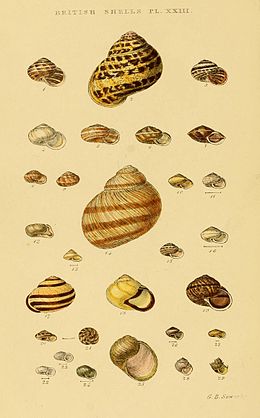

This list comprises 239 species of non-marine molluscs that have been recorded in the scientific literature as part of the fauna of the island of Great Britain; this total excludes species found only in hothouses and aquaria. The list includes terrestrial and aquatic gastropods, and aquatic bivalves. Molluscs that are fully marine (adapted to live in the sea) are not included here, except for two marine pulmonate snails. In other words, this list includes land snails and slugs, and freshwater and brackish water snails. It also includes freshwater mussels and clams, including some that can tolerate brackish water.
Great Britain is a European island in the northeastern Atlantic, comprising the contiguous countries of England, Scotland and Wales. (Great Britain is not the same entity as the United Kingdom of Great Britain and Northern Ireland; for more information on the complex nomenclature of this area, please see terminology of the British Isles.) The mollusc fauna of the island of Ireland, which includes both the Republic of Ireland and Northern Ireland, is listed in another article: List of non-marine molluscs of Ireland.
A number of species of snails listed here are sometimes also found on lists of marine species. Two listed here, in the genera Onchidella and Otina, are fully marine in habitat, but are pulmonate gastropods that breathe air at low tide rather than having gills like most marine species. Other species listed here live in habitats that are intermediate between land and saltwater, or in brackish water habitats intermediate between freshwater and full-salinity saltwater.
Additional species are still being added to the list of the non-marine malacofauna of Great Britain. Four of the more recent discoveries are: Papillifera papillaris, first recorded in 1993 but probably the result of introductions with Italian statuary a century or more earlier;[1][2] Selenochlamys ysbryda, a species new to science, which was first found in 2004;[3][4] Candidula olisippensis, discovered on a Cornish cliff in 2011;[5] and Monacha ocellata, found near Tilbury docks in 2017.[6] Other species have been added to the list as a result of taxonomic revisions; for instance, only in 2009 was it recognised that snails previously known as Pupilla muscorum constituted two sibling species occupying different habitats, with both Pupilla muscorum sensu stricto and Pupilla alpicola occurring in Britain.[7] A major revision of the slug fauna published in 2014, partly based on genetic sequencing, established that there were 20% more species than had previously been recognised.[8][9] Not all these species have been definitely identified and some are formally undescribed.
In addition to the species that survive outdoors in Great Britain, there are also another 15 exotic gastropod species (some terrestrial and some aquatic) which live as "uninvited guests" in greenhouses and their enclosed aquaria.[10] These species are known as "hothouse aliens", and are listed separately at the end of the main list. In this list these species are not counted as part of the fauna. Also not included are species such as Eobania vermiculata[11] and Milax nigricans[10] that have been found outdoors on single occasions but seem never to have established persisting populations.
The following table shows a summary of species numbers.
| Non-marine molluscs of Great Britain | |
|---|---|
| Gastropods land | 152 |
| Gastropods aquatic | 55 (including 2 marine pulmonates) |
| Gastropods total: | 207 |
| Bivalves freshwater | 32 |
| Mollusc total: | 239 |
| Gastropods introduced (in natural habitats): | c. 31 (+16?) land + c. 8 aquatic |
| Bivalves introduced (in natural habitats): | 4 |
| Molluscs introduced in natural habitats, total: updated | 43–59 |
| Gastropods living as "hothouse aliens" | 15 (11 terrestrial + 4 freshwater) (not included in numbers for total fauna) |
| Bivalves living as "hothouse aliens" | 0 |
- ^ Cite error: The named reference
Sharpe2005was invoked but never defined (see the help page). - ^ Cite error: The named reference
Sharpe2010was invoked but never defined (see the help page). - ^ Rowson, B.; Symondson, W.O.C. "Selenochlamys ysbryda sp. nov. from Wales, UK: a Testacella-like slug new to Western Europe (Stylommatophora: Trigonochlamydidae)". Journal of Conchology. 39: 537–552.
- ^ Reise, H.; Hutchinson, J.M.C. (2009). "An earlier record of the slug Selenochlamys ysbryda from Brecon, UK" (PDF). Journal of Conchology. 40: 103.
- ^ Cite error: The named reference
Holyoak2014was invoked but never defined (see the help page). - ^ Cite error: The named reference
Anderson2018was invoked but never defined (see the help page). - ^ Proschwitz, T. von; Schander, C.; Jueg, U.; Thorkildsen, S. (2009). "Morphology, ecology and DNA-barcoding distinguish Pupilla pratensis (Clessin, 1871) from Pupilla muscorum (Linnaeus, 1758) (Pulmonata: Pupillidae)". Journal of Molluscan Studies. 75 (4): 315–322. doi:10.1093/mollus/eyp038.
- ^ Rowson, B.; Anderson, R.; Turner, J.A.; Symondson, W.O.C. (2014). "The slugs of Britain and Ireland: undetected and undescribed species increase a well-studied, economically important fauna by more than 20%". PLOS ONE. 9 (4): e91907. Bibcode:2014PLoSO...991907R. doi:10.1371/journal.pone.0091907. PMC 3989179. PMID 24740519.
- ^ Rowson, B.; Turner, J.; Anderson, R.; Symondson, W. (2014). Slugs of Britain and Ireland: identification, understanding and control. Telford: Field Studies Council. ISBN 978-1-908819-13-0.
- ^ a b Anderson, R. (2005). "An annotated list of the non-marine molluscs of Britain and Ireland". Journal of Conchology. 38 (6): 607–637. ISSN 1753-2205.
- ^ Notton, D. (2006). "Eobania vermiculata in the UK". Mollusc World. 11: 6.